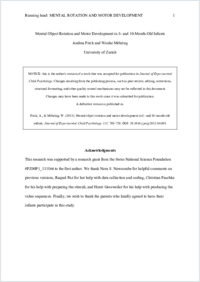Mental object rotation and motor development in 8- and 10-month-old infants
- Frick, Andrea University of Zurich
- Möhring, Wenke University of Zurich
-
2013
Published in:
- Journal of Experimental Child Psychology. - Elsevier. - 2013, vol. 115, no. 4, p. 708-720
Mental rotation
Cognitive development
Spatial cognition
Infants
Motor development
Embodied cognition
English
Recent evidence indicates that 6-month-old infants’ mental rotation of objects profits from prior manual experience, whereas observational experience does not have the same beneficial effect (Möhring, W. & Frick, A., 2013, Child Development). The present study investigated whether older infants, at 8 and 10 months of age, succeed in this task after observational experience only, and whether performance is related to infants’ motor development. Using the violation-of-expectation paradigm, infants (N = 40) were presented with an asymmetrical object that was moved straight down behind an occluder. After the occluder was lowered, infants saw either the original object (possible event) or a mirror image of the original object (impossible event) in one of five different orientations (0° to 180°, in steps of 45°). Results indicated that it was not until 10 months of age that infants looked longer at the impossible outcome. Analyses including parent questionnaire data showed that mental rotation performance was related to infants’ motor development emphasizing the importance of action experience for early cognitive development.
- Faculty
- Faculté des lettres et des sciences humaines
- Department
- Département de Psychologie
- Language
-
- English
- Classification
- Psychology
- License
-
License undefined
- Identifiers
-
- RERO DOC 304984
- DOI 10.1016/j.jecp.2013.04.001
- Persistent URL
- https://folia.unifr.ch/unifr/documents/305976
Statistics
Document views: 120
File downloads:
- Texte intégral: 415
